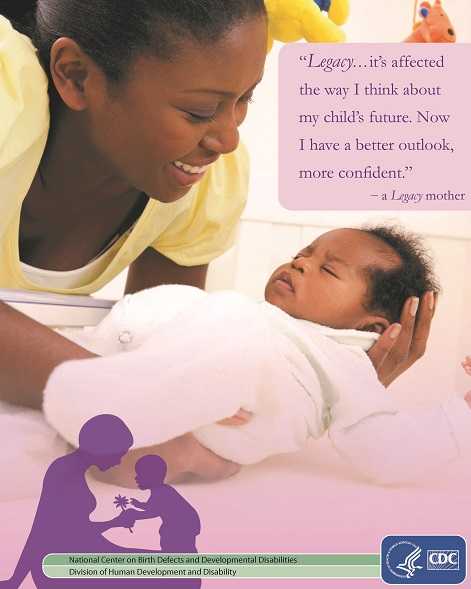Key Findings: Parenting Groups - Do They Change How Mothers Think About Parenting?

The Infant Mental Health Journal has published a new study looking at mothers who participated in the Legacy for Children™ parenting group program, and how it affected their views on parenting. The Legacy program was created to help the development of children affected by poverty by supporting a mother’s positive influence on her child. The Centers for Disease Control and Prevention (CDC) researchers looked at what mothers said about their experiences with the original Legacy programs in Los Angeles and Miami. They found that mothers reported learning a lot about positive parenting practices from the Legacy program.
This is important information for public health professionals who want to support child development and support parents affected by poverty. Read a scientific summary of the article.
Main Findings
- Mothers said they understood and began using the positive parenting practices that are the goals of Legacy:
- Showing commitment to parenting
- Spending time with their child
- Prioritizing their child’s needs
- Embracing the role of a parent
- Working to be sensitive and responsive parents
- Considering their child’s feelings
- Recognizing that their child is unique
- Reflecting on how their responses affect their child
- Guiding their child’s behavior and emotions
- Giving their child appropriate levels of control
- Using positive parenting skills
- Allowing their child to express feelings
- Helping their child learn
- Reading with their child
- Talking with their child
- Playing “grown-up” tasks like cooking and cleaning
- Showing commitment to parenting
- Mothers shared how they sometimes struggled with trying to use different parenting skills.
- Mothers described challenges in finding the right behavior to guide their child and differed in their views on specific behaviors to use.
There were also differences by site:
- Mothers in Miami talked more about making changes in their lives and about the challenges of using positive parenting.
- Mothers in Los Angeles reflected more about their parenting and gave more details about guiding their child’s behavior.
Implications
These findings showed that parenting group interventions can help parents change how they think about parenting. These findings also showed the importance of asking participants their views on how the intervention has affected them, in order to learn about the impact of the Legacy program. For parenting interventions overall, this study emphasized the importance of understanding real-world context. This study also showed the benefit of using qualitative research methods, which are approaches used to understand people’s underlying reasons, opinions, perceptions, or motivations related to certain topics or issues. The qualitative research method used in this study was holding focus groups to understand how the participants experienced the program.
The information from the focus groups has already shaped the creation of intervention training and enrollment materials and helped to improve support and technical assistance for current and future implementers of the Legacy program. Read more about the implementation.
Details About this Study
The Legacy program was evaluated in a research study held in two sites, Los Angeles and Miami. Mothers met weekly in parenting groups. Guided by a group leader, mothers talked about child development, supported each other, learned different parenting skills, and practiced them with their child. The intervention showed a positive effect on children’s behavioral and socioemotional outcomes. You can read details about the intervention and learn more about the study and methods.
For the current report, mothers participated in a series of focus groups that investigated how mothers view their parenting following participation in Legacy. Mothers described their experience with the program in their own words, which provided an “insider” perspective. The responses were reviewed using qualitative research methods that looked for key ideas and recurring themes, organized and summarized them, and compared the ideas and themes for each of the two study sites.
Legacy for Children™
CDC’s Activities on Parenting Interventions
Child development is an important focus for public health, and parenting interventions are one way to improve child outcomes. CDC is working to improve parents’ access to intervention with the following activities:
- Legacy for Children™ implementation
- Partnering with the Administration for Children and Families, Substance Abuse and Mental Health Services Administration and the Health Resources and Services Administration to pilot test implementation in Early Head Start, Project LAUNCH, and Healthy Start, and
- Partnering with the American Academy of Pediatrics to pilot test implementation in primary medical care settings.
- Parenting Matters – a collaboration with other agencies to review the best evidence on effective parenting practices and on how best to support parents.
- Tips and information for parents
More Information
- Legacy for Children™ Intervention
- Child Development
- Children’s Mental Health
- Parenting Matters Report
Publication of This Study
Maternal Perceptions of Parenting Following an Evidence-based Parenting Program: A Qualitative Study of Legacy for Children™
Sophie A. Hartwig, Lara R. Robinson, Dawn L. Comeau, Angelika H. Claussen, and Ruth Perou
Infant Mental Health Journal, Published online June 28, 2017
Additional Publications
- Legacy for Children™: A Pair of Randomized Controlled Trials of a Public Health Model to Improve Developmental Outcomes among Children in Poverty
Ruth Perou, Marc N. Elliott, Susanna N. Visser, Angelika H. Claussen, Keith G. Scott, Leila H. Beckwith, Judy Howard, Lynne F. Katz, D. Camille Smith. BMC Public Health. 2012; 12:691. [Read article] - Behavioral and Socioemotional Outcomes through Age 5 of the Legacy for Children™ Public Health Approach to Improving Developmental Outcomes among Children Born into Poverty
Jennifer W. Kaminski, Ruth Perou, Susanna N. Visser, Keith G. Scott, Leila H. Beckwith, Judy Howard, D. Camille Smith, Melissa L. Danielson. American Journal of Public Health, 2013;103:1058–1066. [Read summary] - Targeting Parenting in Early Childhood: A Public Health Approach to Improve Outcomes for Children Living in Poverty
Amanda Sheffield Morris, Lara R. Robinson, Jennifer Hays-Grudo, Angelika H. Claussen, Sophie A. Hartwig, Amy E. Treat. Child Development, 2017;88(2):388-397. [Read article]
- Page last reviewed: July 14, 2017
- Page last updated: July 14, 2017
- Content source:
- Division of Human Development and Disabilities, National Center on Birth Defects and Developmental Disabilities, Centers for Disease Control and Prevention


 ShareCompartir
ShareCompartir
